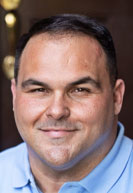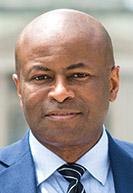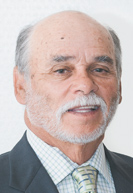Subscriber Benefit
As a subscriber you can listen to articles at work, in the car, or while you work out. Subscribe Now
A renewed attempt to impose a fee on downtown property owners for initiatives aimed at public safety, cleanliness and homelessness in the Mile Square appears poised to succeed after gaining steam among Democrats on the City-County Council.

Four current Democratic councilors—David Ray, Jared Evans, Frank Mascari and La Keisha Jackson—voted against a similar proposal in 2018, when it failed on a 15-8 vote. They now say through a council spokeswoman that they plan to vote Monday night for the proposal sponsored by City-County Council President Vop Osili.
Their support, combined with the votes of Democratic councilors who supported the measure five years ago and of new councilors who have expressed support this year, would be enough to pass the measure despite opposition from the five Republicans on the 25-member council.
Osili said the expected approval is the result of months of work by state legislative leaders, the Indy Chamber, Downtown Indy Inc. and other downtown stakeholders. However, supporters note privately that some opponents still present a threat to undo the council’s tax in next year’s session of the Indiana General Assembly.

“A broad consensus was reached regarding the need to continue to invest in cleanliness, public safety, and direct services for our unhoused neighbors to ensure downtown attracts employers, residents, and visitors through sustainable revenue sources,” Osili said in written remarks. “The passage of Proposal No. 332 will allow us to do just that, which is why I believe it will be supported at next Monday’s full council meeting.”
If the council approves the proposal, a spokeswoman for Democratic Mayor Joe Hogsett said, the mayor will sign it into law.
The ordinance would create an economic enhancement district bordered by North, East, South and West streets—the Mile Square.
A new state-city enhancement district board would ultimately decide whether to impose the tax on Mile Square property owners.
Under the proposal, single-family homeowners would pay an annual $250 flat fee starting in 2025. Based on a formula in the ordinance, owners of commercial properties are expected to pay nearly 0.17% of their properties’ gross assessed value, or about $1,681 per $1 million in GAV.
The measure is expected to generate $5.5 million a year and continue Downtown Indy Inc. enhancement efforts begun a year ago with $3.5 million in federal COVID-19 relief money. That money runs out in June; supporters of the new tax proposal say they hope donations and stretching existing funds can allow the additional IMPD bike patrols, increased frequency in cleaning schedules, and increased homeless-outreach efforts to continue until the ordinance kicks in.
Besides Mile Square enhancements, tax money from the new ordinance would also fund operating costs for a planned low-barrier homeless shelter.
‘Mayor intends to sign it’
Mayoral spokeswoman Aliya Wishner told IBJ the Hogsett administration has been working for a year with Downtown Indy, the Indy Chamber, the Central Indiana Corporate Partnership and the City-County Council to create a sustainable revenue source for those efforts.
“If the City-County Council passes the economic enhancement district proposal in its current form, as amended at committee last week, the mayor intends to sign it,” Wishner said in an email.
The proposed city ordinance itself does not spell out how the tax money would be spent. However, a law the Legislature approved earlier this year to give the City-County Council the authority to create the taxing district provides some guidelines.
The state law says the tax can be used in a variety of ways, including on cleanliness and beautification efforts, operational costs for a low-barrier homeless shelter, homelessness outreach and the hiring of “safety ambassadors.”
Safety ambassadors would be tasked with deterring “aggressive panhandling and other nuisance behavior,” communicating with police about ongoing problems and providing “safety escort services,” among other responsibilities, according to the law.
The council’s approval of the tax also would set into motion the creation of a state-city board to oversee the new district. The board would be composed of four members appointed by Statehouse leaders (who are Republicans) and an equal number appointed by city leaders (who are Democrats).
A majority of the board members must be downtown property owners. Board meetings would be open to the public, and the annual budgets of the board would be submitted to the City-County Council for review.
The law specifically calls on Downtown Indy Inc., a not-for-profit tasked with enhancing and advancing the city’s core, to provide support services to the enhancement district board. The board could hire not-for-profits such as Downtown Indy or private entities to carry out its enhancement efforts, or it could make arrangements with other governmental entities.
Legislative showdown?
While the taxing district appears destined for approval by the council, some supporters have privately expressed concerns that the Indiana Apartment Association, which has long vigorously opposed such fees, will try to persuade legislators to reverse the law in the 2024 session.
Apartment owners as a group would be hardest hit by the new tax, contributing $1.87 million of the $5.5 million expected to be generated annually. The association represents 280,000 rental units throughout the state, including 5,000 within the Mile Square, according to spokesman Charlie Tinkle.

In an emailed statement, Apartment Association President Lynne Petersen said the fee would “only exacerbate the problem” of reduced occupancy rates in commercial and residential buildings by increasing costs.
She did not directly say whether the association would attempt to undo the tax in the Legislature if the City-County Council approves it. However, she said that “everyone should expect this issue to be revisited during the 2024 legislative session.”
Attorney Brian Bosma, who is serving as a spokesman for a group of property, business and apartment owners opposed to the tax, noted in an opinion piece submitted to IBJ that the “ultimate decision on whether to implement the tax rests with the Legislature.”
Bosma, former speaker of the Indiana House of Representatives and now a registered lobbyist, is urging opponents to sign an online petition being promoted by the group he represents, which is calling itself DefendDowntown.com.
Petersen has been particularly critical of the Legislature’s last-minute move earlier this year to allow Indianapolis to impose the tax without having to gather petitions from property owners that support it, a requirement that played a role in killing the 2018 Indianapolis tax proposal.
The new taxing district “is even less reasonable than past efforts to raise taxes because, this time, owners were intentionally excluded from the conversation so the city would have fewer hurdles and less accountability,” Petersen said in written remarks. “As this proposal moves through the council and then the legislature, we encourage city and state leadership to oppose the added tax and instead seek ways to support downtown businesses and residents rather than adding to their financial difficulties.”
‘Recouped in the long run’
Some property owners told IBJ the fee is a necessary measure that could assist in downtown’s pandemic recovery.

Jeff Stroebel, a retired educator and Mass Ave resident, said $250 a year is a small price for individual homeowners to pay in pursuit of the greater good of the community. As downtown attempts to transition from an office-based space to a more residential future, Stroebel said, investments are necessary to make sure downtown areas are conducive to residents, visitors and businesses.
“Quality of life does not come for free,” Stroebel said. “And I acknowledge that the cost of this tax will have different impacts on different people, but I think for most downtown homeowners, $250 is a pretty reasonable amount of money and probably will be recouped in the long run many times over through our quality of life and our property values.”
It’s not a perfect proposal, he added. As a downtown resident and a Democrat, he said, he is concerned about the level of state Republican representation on the board and the exclusion of a portion of the Mass Ave corridor from the taxing district.
Downtown property owners also shouldn’t bear the brunt of the cost, since the area is also used by suburbanites and commuters, Stroebel said.

Some apartment owners also support the measure.
Eric Gershman, principal at Gershman Partners, said he’s backing the proposal because of the success of similar taxing districts in Cincinnati and Austin, Texas.
“When done well, they can be a really good net add to the areas they represent … from safety to place-making to cleaning to physical enhancements,” Gershman said. “We’ve seen them in other cities, worked with them in other cities and are seeing good things overall.”
Gershman estimated his company’s assessed value in the Mile Square at nearly $100 million. The annual downtown enhancement fee for the company would be about $168,000.
Growing support
Some Democrats supporting the taxing district said it is more appealing this time around because of a general agreement to use some of the money to fund operating costs for a proposed low-barrier homeless shelter.

Councilor Monroe Gray said he is among Democrats leaning toward voting for the measure because of the homeless shelter, though he is still mulling over his decision.
Supporters envision the new tax as funding operations of a 30,000-square-foot “housing hub” in the Fountain Square neighborhood. The shelter would lower barriers to entry by eliminating requirements, such as sobriety, that exist at other shelters.
In partnership with Indianapolis-based not-for-profit Rdoor Housing Corp. (formerly Merchants Affordable Housing Corp.), an affordable housing developer, the city bought three parcels of land near the 1000 block of East Georgia Street in late September.
The city has budgeted $12 million in ARPA funds toward the shelter construction and has applied for an additional $20 million in grants from a state task force co-chaired by a Hogsett administration official.
Evans, a councilor who has flipped to favoring the tax this year, told IBJ the creation of a district board that would likely have an equal number of Democrats and Republicans gives the ordinance more bipartisan appeal and shows that the topic is being handled in a “much more professional manner” than the 2018 effort was.
He also said Downtown Indy Inc.’s enhancement efforts over the last year have been successful.
“The downtown community has seen the benefit, and they want to continue it,” said Evans, who represents a west-side district that includes Ben Davis and Mars Hill.
“So my position as a city councilor who represents a district outside of the downtown is like, ‘Hey, if you guys want to increase your taxes to provide those services, I’m OK with that because you and I both know that, if we don’t do that, then those are services that are going to probably be addressed through our current tax dollars, which takes away services from my community.’”•
Please enable JavaScript to view this content.



In an emailed statement, Apartment Association President Lynne Petersen said the fee would “only exacerbate the problem” of reduced occupancy rates in commercial and residential buildings by increasing costs.
Um, Lynne…haven’t we read in IBJ multiple times in the relatively recent past that apartment vacancy rates are extremely low, less than 10%, and demand continues to be strong, with no signs of slowing…??? Exacerbate exactly what problem, Lynne?
There’s a reason the rather-reasonable governor of the state of Indiana is among those who pushed for this solution.
The whining about lack of control and “unlimited tax” is rather special considering it’s a board that’s half Republican appointees, and a majority of the board has to be downtown property owners (presumably people who live in the district).
Has anyone ever asked….ever, for an accounting of all monies received by the city of Indianapolis for covid? I presume we got them. I know schools got money…who is asking …demanding an accounting of all that? Isn’t anyone interested? Am i mistaken about the city getting covid monies directly? Lord knows the distinction without a difference wasn’t interested…but then again he didn’t even understand that he was spotting his opponent a 22.5% lead coming out of the gates….
Yes, the U.S. Treasury Dept. it’s all public information. https://home.treasury.gov/system/files/136/CityOfIndianapolisandMarionCounty_2022RecoveryPlan_SLT-1504.pdf
Sometimes it’s best to finish that cup of coffee before hitting “Post Comment” so you can maybe look back at what you typed and edit it down to a discernible post.
Here’s a perspective – due to the state of Indiana not funding infrastructure needs for Indianapolis at anywhere close to an appropriate level, the city has to take money from it’s budget to try (and fail) to fill the gap.
Maybe if the state would properly fund infrastructure, the city of Indianapolis wouldn’t have to implement yet a new tax.
Joe B +1
If the Hogsett administration is not going to their part on public safety, then all this will be another is a money grab by bureaucrats!
IMPD is the most funded it has ever been…. what else do they need to be successful?
It seems to me that solutions for public safety, cleanliness and homelessness in the Mile Square benefits everyone in the City – not just those that own property downtown. As such, these additional costs should, in my opinion, be shared by everyone who owns property in the City.